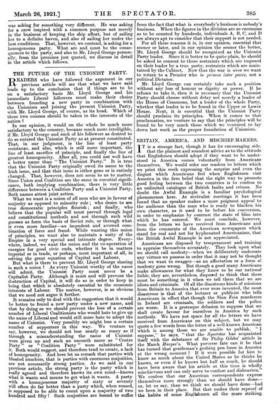THE FUTURE OF THE UNIONIST PARTY. R EADERS who have followed
the argument in our previous article will see that what we have said leads up to the conclusion that if things are to be on a satisfactory basis Mr. Lloyd George and his immediate Liberal followers must make their choice between founding a new party in combination with the Unionists and joining the present Unionist Party, with Mr. Lloyd George, of course, as its head. Which of these two courses should be taken in the interests of the nation ?
In our opinion, it would on the whole be much more satisfactory to the country, because much more intelligible, if Mr. Lloyd George and such of his followers as desired to do so entered the Unionist Party as at present constituted. That, in our judgment, is the line of least party resistance, and also, which is still more important, the line of least sacrifice of principle, and finally the line of greatest homogeneity. After all, you could net well have a better name than " The Unionist Party." It is true that the Unionist Party originally owed its name to the Irish issue, and that that issue is either gone or is entirely changed. That, however, does not seem to us to matter. Since. Union and Coalition are the same in essential s: cane, both implying combination, there is very ittle difference between a Coalition Party and a Unionist Party. Both names attest joint action. What we want is a union of all men who are in favour of majority as opposed to minority rule ; who desire to see true democratic principles flourish ; and finally, who believe that the popular will must prevail through legal and constitutional methods and not through such wild guesses as form the basis of Soviet rule, or through what is even more familiar—an impudent and avowed com- bination of force and fraud. While wanting this union of principles, we want also to maintain a unity of the Empire in a very special and intimate degree. Every- where, indeed, we want the union and the co-operation of energies for good civic ends, whether it be in matters imperial or in trade, or perhaps, most important of all, in solving the great equation of Capital and Labour. But what is there to prevent Mr. Lloyd George sharing in such a union ? As every Unionist worthy of the name will admit, the Unionist Party must never be a Capitalist Party. Although it must and will prevent the destruction of Capital, it will do so in order to keep in being that which is absolutely essential to the economic interests of Labour. The matter, however, is so obvious that we need not argue it further. It remains only to deal with the suggestion that it would be better to found a new party under a new name, and that by doing so we should prevent the loss of a certain number of Liberal Coalitionists who would hate to give up the name of Liberal and would, still more hate to adopt the name of Unionist. Very possibly we might lose a certain number of supporters in this way. We venture to say, however, we should not lose nearly so many as if through a misunderstanding the name of Unionist were given up and such an uncouth name as " Centre Party " or " Coalition Party " were substituted for it. Both would suggest, and therefore tend to create, a lack of homogeneity. And here let us remark that parties with bloated numbers, that is parties with enormous majorities; are not necessarily strong parties. As we said in our previous article, the strong party is the party which is really agreed and therefore knows its own mind—knows what it wants and means to get what it wants. A party with a homogeneous majority of sixty or seventy will often do far better than a party which, when roused, is supposed to be able to count upon a majority of two hundred and fifty ! Such majorities are bound to suffer from the fact that what is everybody's business is nobody's business. When the figures in the division are so enormous as to be counted by hundreds, individuals A, B, C, and D are always apt to consider that their support is not needed. For all these reasons it is, in our opinion, essential that sooner or later, and in our opinion the sooner the better, Mr. Lloyd George should be recognized as the Unionist Party leader. Since it is better to be quite plain, he should be asked to consent to those restraints which are imposed on their leader by a true party, restraints which are main- tained by the Cabinet. Now that the war is over we want to return to a Premier who is prinius inter pares, not a political Dictator.
Mr. Lloyd George can certainly take such a position without any loss of honour or dignity or power. If he refuses to take it, then it is necessary that the Unionist Party should choose without delay not merely a leader of the House of Commons, but a leader of the whole Party, whether that leader is to be found in the Upper or Lower House. Next, it is essential that the Unionist Party should proclaim its principles. When it comes to that proclamation, we venture to say that the principles will be found to be very much those which we ventured to lay down last week as the proper foundation of Unionism.


































 Previous page
Previous page